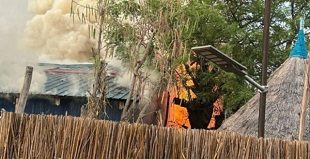
By Bonnie Agea
Opposition candidate can do as they wish, but finally, the political ball game stops with Museveni
In 1992, just six years after capturing state power, President Yoweri Museveni invited secondary students from the Lango sub-region for a political rally at Lira Technical College. The students who were thrilled with excitement and susceptible enthusiasm jumped at the invitation with open hands and gratuitously filled the technical school’s campus when the day came. As an innocent teenager following closely the political vigor at the time, I was in that crowd which was filled with all sorts of political big wigs. Students stood facing the podium as in a school assembly, and the invited guests, the majority politicians, sat in front.
The atmosphere was tense and emotions ran high as the district was still very much an opposition strong hold, and the capital of UPC fanaticism. Cecilia Ogwal, former opposition iron lady, was invited to greet the audience. Throughout her speech echoing heavy political rhetoric, students praised and sang her name. When the time for the chief guest, the president of the country came, the atmosphere changed, and soldiers positioned themselves in strategic locations with secret services units mingling with the heavily nervous students. The first sentence of the president was met with boos, and chants of “you are Rwandese” ran through the waves. And the culprits were students from St Katherine’s Girls school whose Headmistress Beatrice Lagada, who had sat near the president, felt utterly embarrassed.
The President’s mood changed, and within minutes, his speech which was themed on the history of the NRM revolution and ideology, shifted and he started to heavily stammer. The meeting was abruptly cut short, and the students dispersed.
After three days, Beatrice Lagada was tasked with producing the three students who had heckled the president and hand them over to State House. When the parents of the affected students heard of this, they refused, but since it was an order from above, they succumbed. And the rest as they say came to pass as nothing harmful was reportedly meted onto the students. They were instead made to accompany the president to Bweranyangi, a girls’ school in Western Uganda, and moved around the school compound to witness how ‘disciplined students’ ought to behave.
I recall this story as I try to knit together the political events of the post election period in Uganda. In the newspapers, and online forums, it is not a surprise to witness many contributors expressing outrage and anger at what they suspect to be a fraudulent election. And at this hour, if anybody can claim they can cool these tempers and bring the county together, it is President Museveni. Opposition candidate Kizza Besigye or Benon Biraro can do as they wish, but finally, the political ball game will finally come back to the president’s court.
Museveni must come out of his cocoon and unite the country. He is the one in charge of the country’s armed forces, the police, and the prisons. It will be unfortunate if he exercises those powers to stifle genuine and legitimate voices because of his sole phobia of losing state power. Everything always has its beginning and an end. If it is not yet his end, no amount of struggles of the opposition will see him lose power. Opposition leaders in all countries have the same traits, but killing or suppressing them does not guarantee one everlasting state power.
In Kenya, all previous governments have had to overcome the powerful political jingoism and bravado of one Raila Amolo Odinga, but in all these, Odinga has never come close to capturing the presidency. He is instead treated well, respected, and offered all sorts of platforms to practice his trade.
That is why the fuming voices in the streets, villages and social media platforms ought to reach President Museveni and exhort him to intervene, and stop the country from spiraling apart into open raptures as witnessed in 2007 in Kenya where innocent souls lost their lives in deviant street battles with the police. To date, nobody remembers them, or the cause they died for. The politicians as usual, are still fighting for political control.
****
Bonnie Agea is a Ugandan living in Dar es salaam, Tanzania.
 The Independent Uganda: You get the Truth we Pay the Price
The Independent Uganda: You get the Truth we Pay the Price



